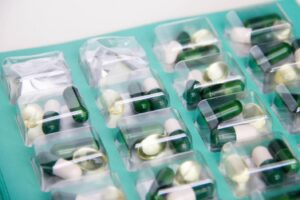
Getting addicted to prescription drugs is easier than many people think. Such addiction can occur when you misuse prescription medication, but it can also occur when you take your medication as prescribed by your doctor. In fact, many people who become addicted to pain medication, anti-anxiety pills, or stimulants did not abuse their medication. Their mind and/or body simply became dependent on the drug over time.
Of course, those who abuse prescription drugs have a much higher risk of becoming addicted to them.
Common prescription medications that have a high addiction risk include benzodiazepines, stimulants, and opioids.
- Common benzodiazepines include Xanax, Valium, and Klonopin.
- Common opioids, or pain relievers, are hydrocodone, OxyContin, morphine, codeine, methadone, and fentanyl.
- Common stimulants include Adderall and Ritalin.
Prescription drug addiction can affect any age group. Whether you’re a teenager or in your senior years, you can fall prey to this kind of addiction, especially if you’re taking the medication recreationally. Or, you keep increasing the dosage to get the same result, also known as tolerance.
Recognizing the signs and symptoms of prescription drug dependence early may be able to prevent addiction.
Prescription Drug Abuse Signs And Symptoms
Signs and symptoms of prescription drug abuse can vary depending on different factors. However, there are some common symptoms to watch out for, such as:
- Experiencing withdrawal symptoms
- Increased tolerance for the drug
- Having a tough time sleeping
- Stealing medication from family or friends
- Buying medication on the streets
- Doctor shopping to get more refills
- Taking the medication solely because of the way it makes you feel
- Numbing out or escaping problems with the medication
- Cravings for more
- Slurred speech
- Confusion
- Constantly thinking about the drug
- Mood swings
Prescription Drugs: The Dangers Of Becoming Addicted To Them
Prescription drugs can be quite helpful at reducing or eliminating suffering in a variety of ways. Those that are facing severe physical pain can get relief from taking pain medication as prescribed. Those that battle anxiety disorders can find some relief with benzodiazepines. And, those who struggle with being able to stay focused may find some benefit from taking stimulants as prescribed.
However, these medications are also addictive. This is why it’s important to get informed about the risk levels of addiction, take as prescribed, and talk to your doctor if you feel you’ve become dependent on a drug.
Abusing prescription drugs can be dangerous. In addition to the risk of becoming addicted to a drug, chronic misuse can lead to physical and mental problems. It can also lead to overdose and/or death.
Prescription Drug Withdrawal Symptoms
For many prescription drugs, you may encounter withdrawal symptoms when you try to come off the drug. Many medications are only supposed to be taken short-term.
For example, someone who’s prescribed pain medication after surgery will only be advised to take that prescription for a certain amount of time. Once that timeframe is up, they’re supposed to stop taking that medication.
Others may take medication longer, such as someone struggling with an anxiety disorder.
Either way, coming off a prescription drug can lead to experiencing a myriad of withdrawal symptoms. If you have become addicted to a drug, it’s best to undergo the withdrawal stage with the support of your physician or addiction expert.
Opioids, benzodiazepines, and stimulants should not be stopped cold turkey or abruptly. This can be quite dangerous. It’s advised to undergo a taper or gradual reduction under the care of a medical expert to minimize withdrawal symptoms.
Opioid withdrawal symptoms include:
- Flu-like symptoms
- Body aches
- Increased heart rate
- Fever
- Runny nose
- Digestive problems
- Chills
Benzodiazepine withdrawal symptoms may include:
- Trouble sleeping
- Increased anxiety
- Mood swings
- Shaking
- Confusion
- Sweating
- Hand tremors
- Hallucinations
- Depression
- Heart palpitations
Stimulant withdrawal symptoms may include:
- Feeling jittery
- Decreased heart rate
- Restlessness
- Slower speech
- Paranoia
- Weight loss
- Chills
- Depression
- Trouble sleeping
- Odd dreams
On the severe end of any of the mentioned drugs, symptoms could include:
- Seizures
- Hallucinations
- Psychosis
Those with moderate to severe prescription drug addictions are advised to attend an inpatient or outpatient detox center or rehab for treatment. Having around-the-clock medical care can be helpful if life-threatening complications occur.
Prescription Drug Abuse Treatment
If you or a family member have become addicted to prescription drug medication, know that there is treatment available to get free from this addiction. You do not have to try to get off of the drug alone. It’s actually much safer to undergo the detox or withdrawal stage under the care of a medical professional who understands addiction and recovery.
The first step toward getting free from any addiction is to get through the detox stage. This can last anywhere from a few days to a week or more. When you go through the detox phase under the care of an addiction specialist, you’re much more apt to experience less intense symptoms or complications.
As mentioned, getting off of opioids, benzos, or stimulants require a gradual reduction in the medication. This is something that you can discuss with your physician as you walk the path of addiction recovery.
Once the detox phase is completed, you can continue treatment to get stronger in your recovery. Many people opt to attend an inpatient rehab program, where they pack up and live at the facility for the duration of their treatment. This is helpful because they can take some time to solely focus on themselves in recovery. For those who struggle with moderate to severe addiction issues, an inpatient or residential program is suggested.
For those who cannot leave home to attend treatment, an outpatient treatment center is a great option. You will still get professional addiction recovery treatment, but you’ll be able to remain living at home for the duration of treatment.
Whether you attend inpatient or outpatient treatment, you’ll have access to a physician and counselor to address any other issues that may be going on.

Into Action Recovery Society: Here To Treat Prescription Drug Addiction
Here at Into Action Recovery Society, we offer three programs to help you get free from addiction:
1. The First Stage Residential Supportive Recovery Program
2. Second Stage Short-Term Residential Transitional Program
3. Third Stage Long-Term Sober Living Program
Our team is comprised of substance use professionals who can help you get free from addiction to alcohol, prescription or illegal drugs, and behavioral addictions like gambling, gaming, and more. We are dedicated to offering expert, compassionate treatment that helps you break the disease of addiction.
You can recover from prescription drug addiction. It takes time, effort, and a plan. Feel free to give us a call today so we can discuss with you how we can help you break free from addiction. We will also answer any questions or concerns you may have.
